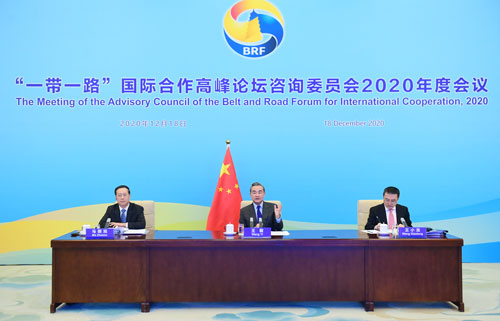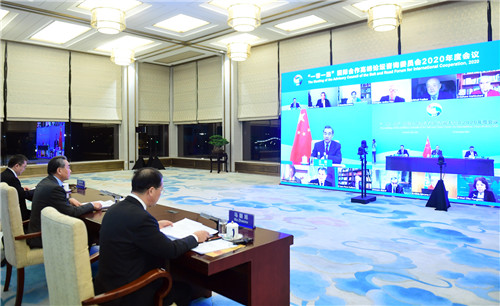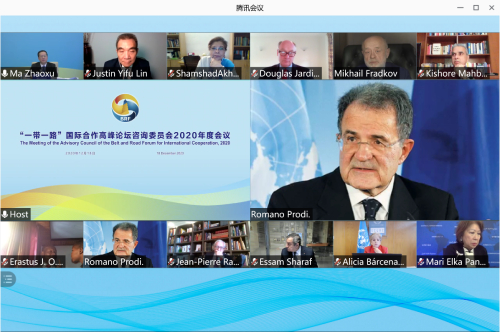
Chinese State Councilor and Foreign Minister Wang Yi (C) attends an Advisory Council of the Belt and Road Forum for International Cooperation meeting via video link, in Beijing, December 18, 2020. (Photo: Chinese Foreign Ministry)
Chinese State Councilor and Foreign Minister Wang Yi Friday said that cooperation under the Belt and Road Initiative (BRI) has stayed resilient, despite the coronavirus pandemic.
Wang made the remarks at an online meeting of the Advisory Council of the Belt and Road Forum for International Cooperation (BRF).
Friday's meeting discussed the progress, opportunities and challenges of international cooperation under the BRI as well as the areas for expanding cooperation under the new circumstances.
Founded in 2018, the Advisory Council aims to provide intellectual support for the BRF and related international cooperation. Its members include former politicians, experts and scholars.
"In the face of the impact of the COVID-19, the cooperation under BRI has shown great resilience and vitality, playing an important role in fighting the epidemic, stabilizing the economy and protecting people's livelihoods, and making a positive contribution to the implementation of the UN 2030 Agenda for Sustainable Development," said Wang.
He reiterated that China's determination to promote international cooperation under the BRI would not change no matter how the international situation changes.
The Chinese foreign minister reiterated the initiatives of establishing universal systems for healthcare and cybersecurity along the Silk Road.
He noted that China has joined COVAX, an international initiative co-led by the World Health Organization that aims at ensuring equitable global access to COVID-19 vaccines.
Wang said when COVID-19 vaccines co-developed by Chinese enterprises and BRI partner countries and now into phase three trials are available, BRI partners will benefit from them.
He also touched on criticisms of the BRI as a geopolitical tool by China, saying it is a platform that shares both benefits and risks.

Chinese State Councilor and Foreign Minister Wang Yi attends an Advisory Council of the Belt and Road Forum (BRF) for International Cooperation meeting via video link, in Beijing, December 18, 2020. (Photo: Chinese Foreign Ministry)
BRF Advisory Council highlights new opportunities in BRI cooperation
Members of the Advisory Council told the meeting that great potential in post-pandemic cooperation existed under the BRI.
Echoing Wang's remarks, Council members stressed that the BRI is a major initiative to support multilateralism, promote world economic growth and facilitate South-South Cooperation, embodying a new concept and model of cooperation.

The Advisory Council of the Belt and Road Forum for International Cooperation (BRF) holds a video conference, December 18, 2020. (Photo: Chinese Foreign Ministry)
According to the meeting, against the backdrop of the epidemic and the world economic recession, the BRI not only demonstrates the resilience to cope with risks, but also builds a platform and provides support for partners to fight the coronavirus epidemic, stabilize the economy and promote development, and in so doing demonstrate its strong vitality and influence.
Members of the Advisory Council said there are more opportunities than challenges in the joint construction of the BRI and that China's new development pattern will bring historic opportunities for the development of the initiative.
They added the development strategy will make the Chinese economy more robust and resilient, further promoting the dual domestic and international cycles and opening up to the outside world.
Council members also highly praised President Xi Jinping's concept on making the Belt and Road a model of cooperation in fields like healthcare, economic recovery and growth, saying that the idea pointed out the direction for the construction of the BRI.


